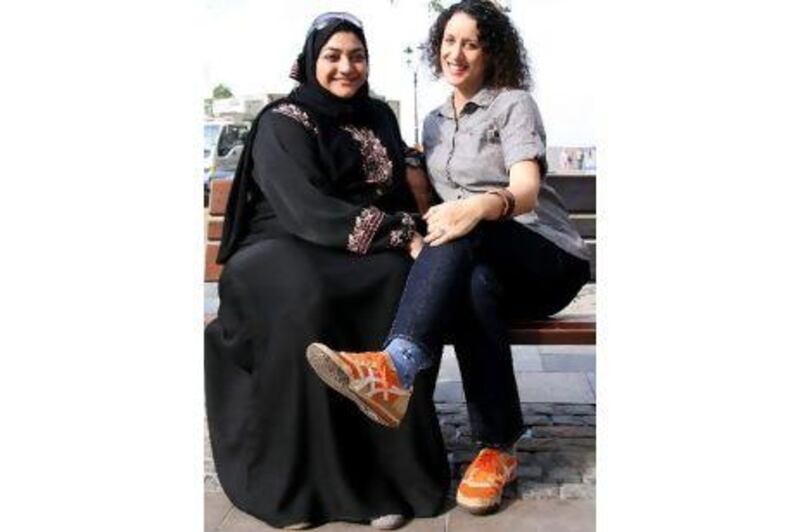DUBAI // Expatriates and Emiratis will soon be able to speak the same language with the launch later this month of the first course dedicated to teaching the nation's distinctive form of Arabic.
The initiative is aimed at residents who want to talk to Emiratis in their own dialect, in some cases to gain a head start in business.
But it is also attracting interest from Emiratis who have grown up abroad and never learned the native version of their language.
The organisers hope the "Learn to Speak Emirati" course will support efforts to preserve and promote the UAE's national identity, as well as build bridges between different communities.
"We're a very proud community and we love it when someone takes the initiative and comes to do something from our culture, like speaking our language," said Shaima al Sayed, the Emirati instructor who will run the lessons in Dubai.
"Each Arab country has its own dialect. So it's nice to actually teach people - since they've come to Dubai - the dialect of Dubai, rather than have them come here and learn Lebanese or Egyptian and all these other dialects that are not even related to our dialect. It's really nice to try to maintain our own identity."
The course will cover only spoken Arabic and focus on the colloquial form of the language, rather than the classical style taught in schools. The approach will be practical, with a focus on words and phrases that students use in their daily lives.
"Our goal is that by the end of 12 weeks, students will be able to share a conversation with an Emirati and be able to form simple sentences comfortably," Ms al Sayed said.
"Since Dubai is such a cosmopolitan city everyone comes here and the Lebanese keep speaking the Lebanese dialect and the Egyptians speak the Egyptian dialect. We understand all that but no one really knows how to speak Emirati - there are words that are different.
The variation in Arabic does not stop at national borders - Ms al Sayed said each of the UAE's seven emirates had its own dialect.
"There are small differences. If someone comes from Kuwait or Bahrain, to them it just sounds Emirati, but I know that this person is from, say, Abu Dhabi because of the words, the way he says them - you can tell them apart.
"It's like when an Indian speaks English it sounds different than when a Filipino speaks it, but the basis is the same. It's the same thing across the UAE."
The course will be conducted in the Dubai dialect, which Ms al Sayed described as "neutral" Emirati. "There's a slight difference between Dubai and Abu Dhabi, it's like you'd say there's a tiny difference between an American and a Canadian accent. You really have to know the accents to catch them," she said.
"We expect to attract mainly foreigners to the lessons, people who have been here five years and think, 'I see myself living here for another four or five years and I'd like to interact with Emiratis and speak to them'. Some of them want to impress Emiratis by showing they can speak Emirati."
The course is being organised by the Dubai-based arts training company, Dubomedy, and is a departure from the stand-up comedy classes it is best known for.
The founder and artistic director Mina Liccione, a New Yorker, has first-hand experience of how knowledge of Arabic can assist at work. "It definitely helps professionally," she said. "The majority of people who have been inquiring about the course are from business. I'm a professor at the New York Film Academy in Abu Dhabi and many of my students' first tongue is Arabic, so for me the more Arabic I learn the more I connect with my students.
"And there was a teacher who felt the same way as me, she felt she wasn't connecting to her students, she wanted to at least be able to converse with them. The more Arabic that westerners use the more we connect to where we are.
The chief executive of Dubomedy, Ali al Sayed, said: "The idea of why we said 'let's teach people Emirati' is because they live here. Most people will ask their Lebanese colleagues, 'How do you say this in Arabic?' and wind up learning Lebanese words while they're in the UAE.
"Or they think hummus is an Emirati dish - it's not, it's a Lebanese dish. The idea is to bring some of the Emirati culture to the people who live here - you live in the Emirates and you learn Emirati, rather than the Lebanese dialect.
"Maybe it is, in a way, an attempt to push the Emirati culture forward - to make people come a bit closer, at first through language and then hopefully the rest will follow."
The course of 12 weekly, two-hour lessons starts on January 25 at the Dubai Community Theatre and Arts Centre at the Mall of the Emirates and costs Dh1,500. Dubomedy plans to launch level two and level three courses later in the year.






